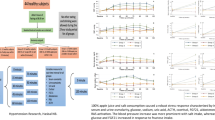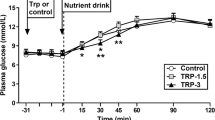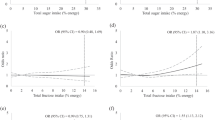Abstract
Background/Objective:
Excessive fructose intake has been linked to hyperuricaemia. Our aim was to test whether 355 and 600 ml of commercial sugar-sweetened soft drinks would acutely raise plasma uric acid.
Subjects/Methods:
Forty-one participants were randomised to a control group or an intervention group. The control group consumed 600 ml of fructose and 600 ml of glucose beverages. The soft drink group consumed 355 and 600 ml of beverages in random order. The control beverages were matched for fructose content with 600 ml of soft drink (26.7 g). Blood samples were collected at baseline, 30 and 60 min and analysed for plasma uric acid.
Results:
Plasma uric acid concentrations were 13 (95% confidence interval: (CI): 3, 23) and 17 μmol/l (95% CI: 6, 28) higher 30 and 60 min after consumption of 600 ml of soft drink compared with the glucose control. The corresponding values for the fructose beverage were 22 (95% CI: 16, 29) and 23 μmol/l (95% CI: 14, 33). There was no significant difference in the increase in uric acid following the 600-ml soft drink compared with the fructose control at 30 min (6 μmol/l; 95% CI: −4, 15) or 60 min (5 μmol/l; 95% CI: −7, 17). There was no difference in the uric-acid-raising effect between the 355 and 600 ml volumes at 30 min (−1 μmol/l; 95% CI: −9, 6) or 60 min (−5 μmol/l; 95% CI: −10, 1).
Conclusion:
Small and transient increases in plasma uric acid are likely after consumption of sucrose-sweetened commercially available single-serve soft drinks in volumes as small as 355 ml.
This is a preview of subscription content, access via your institution
Access options
Subscribe to this journal
Receive 12 print issues and online access
$259.00 per year
only $21.58 per issue
Buy this article
- Purchase on Springer Link
- Instant access to full article PDF
Prices may be subject to local taxes which are calculated during checkout

Similar content being viewed by others
References
Angelopoulos TJ, Lowndes J, Zukley L, Melanson KJ, Nguyen V, Huffman A et al. The effect of high-fructose corn syrup consumption on triglycerides and uric acid. J Nutr 2009; 139: 1242S–1245S.
Elliot S, Keim N, Stern J, Teff K, Havel P . Fructose, weight gain, and the insulin resistance syndrome. Am J Clin Nutr 2002; 76: 911–922.
Sievenpiper JL . Fructose: where does the truth lie? J Am Coll Nutr 2012; 31: 149–151.
European Food Safety Authority. Scientific opinion on the substantiation of health claims related to fructose and reduction of post-prandial glycaemic responses. EFSA J 2011; 9: 2233.
Nguyen S, Choi HK, Lustig RH, Hsu CY . Sugar-sweetened beverages, serum uric acid, and blood pressure in adolescents. J Pediatr 2009; 154: 807–813.
Bray G . Fructose: pure, white and deadly? Fructose, by any other name, is a health hazard. J Diabetes Sci Technol 2010; 4: 1003–1007.
Bray G, Nielsen S, Popkin B . Consumption of high-fructose corn syrup in beverages may play a role in the epidemic of obesity. Am J Clin Nutr 2004; 79: 537–543.
Lin WT, Huang HL, Huang MC, Chan TF, Ciou SY, Lee CY et al. Effects on uric acid, body mass index and blood pressure in adolescents of consuming beverages sweetened with high-fructose corn syrup. Int J Obes (Lond) 2013; 37: 532–539.
Bobridge KS, Haines GL, Mori TA, Beilin LJ, Oddy WH, Sherriff J et al. Dietary fructose in relation to blood pressure and serum uric acid in adolescent boys and girls. J Hum Hypertens 2013; 27: 217–224.
Stanhope KL, Schwarz JM, Keim NL, Griffen SC, Bremer AA, Graham JL et al. Consuming fructose-sweetened, not glucose-sweetened, beverages increases visceral adiposity and lipids and decreases insulin sensitivity in overweight/obese humans. J Clin Invest 2009; 119: 1322–1334.
Maersk M, Belza A, Stodkilde-Jorgensen H, Ringgaard S, Chabanova E, Thomsen H et al. Sucrose-sweetened beverages increase fat storage in the liver, muscle, and visceral fat depot: a 6-mo randomized intervention study. Am J Clin Nutr 2012; 95: 283–289.
Lima WG, Martins-Santos ME, Chaves VE . Uric acid as a modulator of glucose and lipid metabolism. Biochimie 2015; 116: 17–23.
Choi HK, Curhan G . Soft drinks, fructose consumption, and the risk of gout in men: prospective cohort study. BMJ 2008; 336: 309–312.
Choi HK, Willett W, Curhan G . Fructose-rich beverages and risk of gout in women. JAMA 2010; 304: 2270–2278.
Bruun JM, Maersk M, Belza A, Astrup A, Richelsen B . Consumption of sucrose-sweetened soft drinks increases plasma levels of uric acid in overweight and obese subjects: a 6-month randomised controlled trial. Eur J Clin Nutr 2015; 69: 949–953.
Le MT, Frye RF, Rivard CJ, Cheng J, McFann KK, Segal MS et al. Effects of high-fructose corn syrup and sucrose on the pharmacokinetics of fructose and acute metabolic and hemodynamic responses in healthy subjects. Metabolism 2012; 61: 641–651.
Wang DD, Sievenpiper JL, de Souza RJ, Chiavaroli L, Ha V, Cozma AI et al. The effects of fructose intake on serum uric acid vary among controlled dietary trials. J Nutr 2012; 142: 916–923.
University of Otago and Ministry of Health A Focus on Nutrition. Key Findings of the 2008/09 New Zealand Adult Nutrition Survey. Ministry of Health: Wellington, New Zealand, 2011.
Dalbeth N, House ME, Gamble GD, Horne A, Pool B, Purvis L et al. Population-specific influence of SLC2A9 genotype on the acute hyperuricaemic response to a fructose load. Ann Rheumat Dis 2013; 72: 1868–1873.
Akhavan T, Anderson G . Effects of glucose-to-fructose ratios in solutions on subjective satiety, food intake and satiety hormones in young men. Am J Clin Nutr 2007; 86: 1354–1363.
Tappy L, Le KA . Metabolic effects of fructose and the worldwide increase in obesity. Physiol Rev 2010; 90: 23–46.
Aeberli I, Gerber PA, Hochuli M, Kohler S, Haile SR, Gouni-Berthold I et al. Low to moderate sugar-sweetened beverage consumption impairs glucose and lipid metabolism and promotes inflammation in healthy young men: a randomized controlled trial. Am J Clin Nutr 2011; 94: 479–485.
Grigoresco C, Rizkalla SW, Halfon P, Bornet F, Fontvieille AM, Bros M et al. Lack of detectable deleterious effects on metabolic control of daily fructose ingestion for 2-mo in Niddm patients. Diabetes Care 1988; 11: 546–550.
Ames BN, Cathcart R, Schwiers E, Hochstein P . Uric acid provides an antioxidant defense in humans against oxidant- and radical-caused aging and cancer: a hypothesis. Proc Natl Acad Sci USA 1981; 78: 6858–6862.
Becker BF . Towards the physiological-function of uric-acid. Free Radic Biol Med 1993; 14: 615–631.
Vukovic J, Modun D, Budimir D, Sutlovic D, Salamunic I, Zaja I et al. Acute, food-induced moderate elevation of plasma uric acid protects against hyperoxia-induced oxidative stress and increase in arterial stiffness in healthy humans. Atherosclerosis 2009; 207: 255–260.
Johnston RD, Stephenson MC, Crossland H, Cordon SM, Palcidi E, Cox EF et al. No difference between high-fructose and high-glucose diets on liver triacylglycerol or biochemistry in healthy overweight men. Gastroenterology 2013; 145: 1016–1025. e2.
Evans SA, Doblado M, Chi MM, Corbett JA, Moley KH . Facilitative glucose transporter 9 expression affects glucose sensing in pancreatic beta-cells. Endocrinology 2009; 150: 5302–5310.
Augustin R . The protein family of glucose transport facilitators: it's not only about glucose after all. IUBMB Life 2010; 62: 315–333.
Acknowledgements
The study was funded by the University of Otago.
Author contributions
The project idea for this study was from BV. The project was designed and conducted by EC, SW, AR and BV. JH undertook statistical analysis. EC, BV, JH and AR prepared the manuscript. All authors read and approved the final version of the manuscript to be submitted.
Author information
Authors and Affiliations
Corresponding author
Ethics declarations
Competing interests
The authors declare no conflict of interest.
Rights and permissions
About this article
Cite this article
Carran, E., White, S., Reynolds, A. et al. Acute effect of fructose intake from sugar-sweetened beverages on plasma uric acid: a randomised controlled trial. Eur J Clin Nutr 70, 1034–1038 (2016). https://doi.org/10.1038/ejcn.2016.112
Received:
Revised:
Accepted:
Published:
Issue Date:
DOI: https://doi.org/10.1038/ejcn.2016.112
This article is cited by
-
Relationship between high fructose corn syrup sweetened drinks, diet soft drinks, and serum sodium: NHANES 2003–2006
Nutrition Journal (2022)
-
Association between non-optimal temperature and hospitalizations for gout in Anqing, China: a time-series analysis
Environmental Science and Pollution Research (2022)
-
Sugar and artificially sweetened beverages and risk of obesity, type 2 diabetes mellitus, hypertension, and all-cause mortality: a dose–response meta-analysis of prospective cohort studies
European Journal of Epidemiology (2020)
-
Seasonal variations of urate in a Swedish adult population
Clinical Rheumatology (2017)



